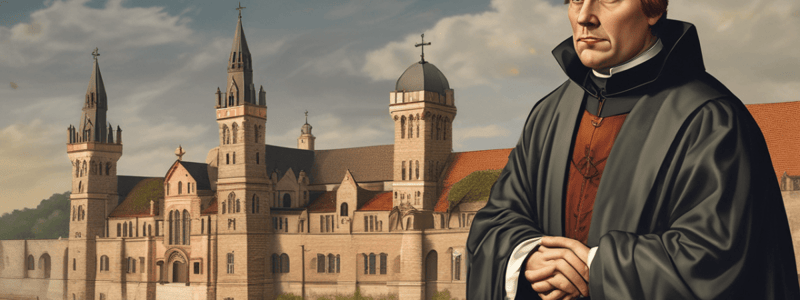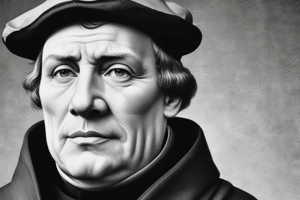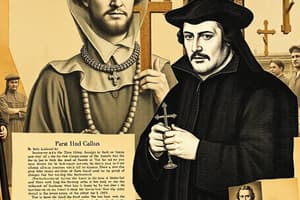Podcast
Questions and Answers
What percentage of the course material has been covered so far?
What percentage of the course material has been covered so far?
- 50%
- 20%
- 90%
- 10% (correct)
Who is the next topic to be discussed in the course?
Who is the next topic to be discussed in the course?
- Frederick the Wise
- Blaise Pascal (correct)
- Martin Luther
- Desiderius Erasmus
What was the main reason for the 'abject failure' to enforce the papal bull?
What was the main reason for the 'abject failure' to enforce the papal bull?
- Lack of resources
- Fear of Luther's followers
- Lack of support from the Emperor
- Fear of Frederick the Wise, the knights, and public opinion (correct)
What was the significance of the printing press in Luther's Reformation?
What was the significance of the printing press in Luther's Reformation?
What was the main purpose of Aleander's trip to the Low Countries in September 1520?
What was the main purpose of Aleander's trip to the Low Countries in September 1520?
Who did Frederick the Wise meet with around the time Charles the Fifth was crowned as the new Emperor?
Who did Frederick the Wise meet with around the time Charles the Fifth was crowned as the new Emperor?
What was Erasmus' view of Christianity?
What was Erasmus' view of Christianity?
What did Erasmus say about Luther during his meeting with Frederick the Wise?
What did Erasmus say about Luther during his meeting with Frederick the Wise?
What was the significance of Luther's pamphlets in the Reformation?
What was the significance of Luther's pamphlets in the Reformation?
What event marked a dramatic act of defiance against the church by Luther?
What event marked a dramatic act of defiance against the church by Luther?
What was Luther's public persona, despite his private fears?
What was Luther's public persona, despite his private fears?
Who refused to deliver the summons to Luther for the Diet of Worms?
Who refused to deliver the summons to Luther for the Diet of Worms?
What was associated with wisdom in the 16th century?
What was associated with wisdom in the 16th century?
What was the reason for Luther's request for time to think about his answer at the Diet of Worms?
What was the reason for Luther's request for time to think about his answer at the Diet of Worms?
What was the significance of Luther's response in German at the Diet of Worms?
What was the significance of Luther's response in German at the Diet of Worms?
Who approached Luther for marriage advice?
Who approached Luther for marriage advice?
What was the outcome of Luther's advice to Philip of Hesse on his marriage issues?
What was the outcome of Luther's advice to Philip of Hesse on his marriage issues?
What did the Emperor's Spanish aide-de-camp do to a portrait of Luther?
What did the Emperor's Spanish aide-de-camp do to a portrait of Luther?
What did the author of the text want to buy in Wittenberg in 2011?
What did the author of the text want to buy in Wittenberg in 2011?
Flashcards are hidden until you start studying
Study Notes
Course Progress
- The course is chronologically halfway through, but only a tenth of the way through the material.
- The next topic will be Blaise Pascal, a 17th-century Catholic philosopher and theologian.
Luther and the Jews
- Luther's views on the Jews are a common topic of discussion and require a thoughtful response.
- The question "Didn't Luther cause the Holocaust?" is often asked, and an answer that neither excuses nor blames Luther is necessary.
Luther's Reformation
- The papal bull has arrived, but there has been an "abject failure" to enforce it due to the fear of Frederick the Wise, the knights, and public opinion.
- The printing press enabled the spread of information and ideas over significant geographical distances, making public opinion a significant factor for the first time in history.
- Luther's pamphlets, with woodcuts and cartoons, were an effective way to communicate his message to a largely illiterate population.
Aleander and the Papal Nuncio
- Aleander, the papal nuncio, traveled to the Low Countries in September 1520 and obtained the Emperor's mandate for the burning of Lutheran books.
Charles the Fifth and Frederick the Wise
- Charles the Fifth was crowned as the new Emperor in September 1520, but Frederick the Wise did not attend due to "health reasons".
- Frederick the Wise met with Desiderius Erasmus, a great intellectual and humanist, around this time, which would have significant consequences for Luther.
Erasmus and Luther
- Erasmus, born in 1466, was a supreme man of letters and a pioneer of New Testament Greek studies.
- He was a key figure in the cultural reform movement of humanism and helped pave the way for the Reformation.
- Erasmus met with Frederick the Wise and gave his opinion of Luther, saying he had attacked the Pope's power and the monks' bellies.
- Erasmus saw Christianity as a simple, non-doctrinal religion of doing good, and his meeting with Frederick the Wise would have significant consequences.
Luther's Growing Confidence
- Luther gained strong support in Europe from the patriotic knights.
- The church's weakness and Frederick the Wise's inaction emboldened Luther to take a stand.
- On December 10, 1520, Luther and his colleagues burned the papal bull and volumes of canon law, a dramatic act of defiance against the church.### Martin Luther's Rise to Fame
- Luther's popularity was massive, and his writings and ideas spread rapidly, making him a rock star of his time.
- People, including those who couldn't read, were buying posters of Luther, and his name was on everyone's lips.
Luther's Fear and Trash Talking
- Luther's public persona was that of a bold and fearless leader, but in his private writings, he was nuanced and fearful of the consequences of his actions.
- Luther's "trash talking" was a way of hiding his fear, similar to Muhammad Ali's tactics before a big fight.
The Diet of Worms
- Luther was summoned to the Diet of Worms, where he would be forced to defend his ideas and potentially face punishment.
- The Diet of Worms was a highly dangerous and unpredictable situation for Luther, and he knew it.
- Luther's chances of emerging unscathed depended on the goodwill of others, and he was aware of the precedent set by John Huss, who was burned at the stake.
The Emperor's Involvement
- The Emperor, Charles V, asked Frederick the Wise to deliver the summons to Luther, but Frederick refused, saying he had nothing to do with Luther.
- Luther eventually received the summons from the imperial herald, Kasper, and set out to visit the major cities on his way to Worms.
Wisdom and the Location of Wisdom
- In the 16th century, wisdom was associated with the church and the minister, whereas in modern times, it is often associated with youth, medicine, and technology.
- Luther, as a minister, was seen as a source of wisdom, not just for spiritual guidance but also for advice on everyday matters.
Philip of Hesse's Marriage Issues
- Philip of Hesse approached Luther for marriage advice, claiming that his wife was unattractive and had rendered him impotent.
- Luther refused to sanction divorce, but years later, Philip of Hesse would ask Luther and Melanchthon for advice on a similar issue, and they would give him disastrous advice, leading to accusations of polygamy.
The Emperor's Revenge
- When the Emperor finally moved against the Schmalkaldic League, he arrived in Wittenberg, and in a dramatic scene, his Spanish aide-de-camp slashed a portrait of Luther, but the Emperor refused to dig up Luther's grave and burn his remains, saying "I make no war on dead men."### The Author's Personal Story
- In 2011, the author saw four-foot-high fiberglass statues of Luther in Wittenberg and wanted to buy one, but his wife refused.
- The author wanted to display the statue in his bedroom or front garden, but his wife thought it would be tacky.
- The author also bought a painting of John Owen, but his wife thought it would be creepy to hang it over their bed, so they compromised and hung it inside the front door.
The Diet of Worms
- The Diet of Worms was a pivotal moment in Luther's life, where he was brought before the Emperor Charles V and the most powerful church and empire dignitaries in Europe.
- Luther was asked to identify his books and recant their content, but he asked for time to think about his answer, which was unusual.
- The reason for Luther's request is unknown, but it could have been a moment of doubt or part of the Elector of Saxony's strategy to throw the opposition off their stride.
- The gathering was adjourned until the next day, and when Luther returned, he responded in German and then repeated his answer in Latin, making a point that he was speaking first and foremost to the Germans.
The Significance of Luther's Response
- Luther's response in German was a powerful moment, as he was addressing the Emperor and the German people in their common tongue.
- Luther's use of German and then Latin emphasized that he was a German problem, and the resolution must be a German issue.
- The author compares Luther's use of language to Gerald Bray, an Anglican theologian who is a linguistic genius, and notes that Luther's message was that he was speaking to the Germans, and the rest of Europe would have to wait their turn.
Course Progress
- The course is halfway through, but only a tenth of the way through the material.
- The next topic will be Blaise Pascal, a 17th-century Catholic philosopher and theologian.
Luther and the Jews
- Luther's views on the Jews require a thoughtful response.
- The question "Didn't Luther cause the Holocaust?" is often asked, and an answer that neither excuses nor blames Luther is necessary.
Luther's Reformation
- The papal bull has arrived, but its enforcement failed due to the fear of Frederick the Wise, the knights, and public opinion.
- The printing press enabled the spread of information and ideas over significant geographical distances, making public opinion a significant factor.
- Luther's pamphlets, with woodcuts and cartoons, effectively communicated his message to a largely illiterate population.
Aleander and the Papal Nuncio
- Aleander, the papal nuncio, traveled to the Low Countries in September 1520 and obtained the Emperor's mandate for the burning of Lutheran books.
Charles the Fifth and Frederick the Wise
- Charles the Fifth was crowned as the new Emperor in September 1520, but Frederick the Wise did not attend due to "health reasons".
- Frederick the Wise met with Desiderius Erasmus, a great intellectual and humanist, around this time, which had significant consequences for Luther.
Erasmus and Luther
- Erasmus, born in 1466, was a supreme man of letters and a pioneer of New Testament Greek studies.
- He was a key figure in the cultural reform movement of humanism and helped pave the way for the Reformation.
- Erasmus met with Frederick the Wise and gave his opinion of Luther, saying he had attacked the Pope's power and the monks' bellies.
Luther's Growing Confidence
- Luther gained strong support in Europe from the patriotic knights.
- The church's weakness and Frederick the Wise's inaction emboldened Luther to take a stand.
- On December 10, 1520, Luther and his colleagues burned the papal bull and volumes of canon law, a dramatic act of defiance against the church.
Martin Luther's Rise to Fame
- Luther's popularity was massive, and his writings and ideas spread rapidly, making him a rock star of his time.
- People, including those who couldn't read, were buying posters of Luther, and his name was on everyone's lips.
Luther's Fear and Trash Talking
- Luther's public persona was that of a bold and fearless leader, but in his private writings, he was nuanced and fearful of the consequences of his actions.
- Luther's "trash talking" was a way of hiding his fear.
The Diet of Worms
- Luther was summoned to the Diet of Worms, where he would be forced to defend his ideas and potentially face punishment.
- The Diet of Worms was a highly dangerous and unpredictable situation for Luther, and he knew it.
- Luther's chances of emerging unscathed depended on the goodwill of others, and he was aware of the precedent set by John Huss, who was burned at the stake.
The Emperor's Involvement
- The Emperor, Charles V, asked Frederick the Wise to deliver the summons to Luther, but Frederick refused.
- Luther eventually received the summons from the imperial herald, Kasper, and set out to visit the major cities on his way to Worms.
Wisdom and the Location of Wisdom
- In the 16th century, wisdom was associated with the church and the minister, whereas in modern times, it is often associated with youth, medicine, and technology.
- Luther, as a minister, was seen as a source of wisdom, not just for spiritual guidance but also for advice on everyday matters.
Philip of Hesse's Marriage Issues
- Philip of Hesse approached Luther for marriage advice, claiming that his wife was unattractive and had rendered him impotent.
- Luther refused to sanction divorce.
The Emperor's Revenge
- When the Emperor finally moved against the Schmalkaldic League, he arrived in Wittenberg, and his Spanish aide-de-camp slashed a portrait of Luther.
- The Emperor refused to dig up Luther's grave and burn his remains, saying "I make no war on dead men."
Studying That Suits You
Use AI to generate personalized quizzes and flashcards to suit your learning preferences.




